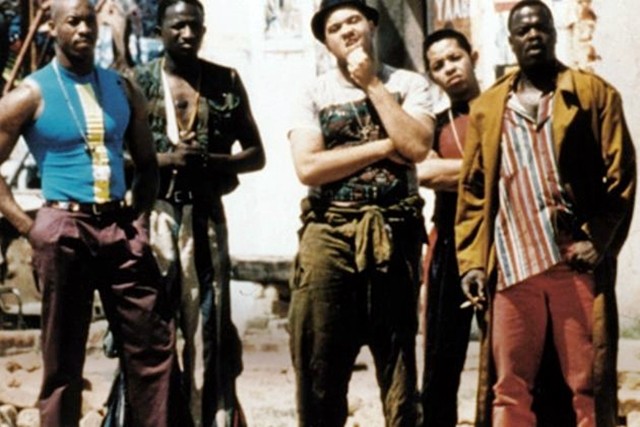
By Jae-Ha Kim
Chicago Sun-Times
February 6, 1998
![]()
Halfway through the satirical film “Aristotle’s Plot,” the narrator asks, “Why are African filmmakers always asked political questions?”
The question makes the viewer smile because it is embarrassingly accurate.
Opening today for an exclusive one-week run at Facets Multimedia, “Aristotle’s Plot” depicts the friction between Essomba (Albee Lesotho), an earnest Afrocentric filmmaker trying to drive Hollywood pictures out of Africa, and a gang of Hollywood action film buffs led by Cinema (Seputla Seboghi), who have no interest in watching the African films Essomba wants shown at the local movie theater.
After the violent confrontation between Essomba and Cinema’s gang, a policeman asks each what he does for a living. The former says he is a cineaste. The latter says he sees movies.
“Watching films is not a job,” the cop says.
Try telling that to Siskel and Ebert and their numerous clones.
Set in a small African town, the movie’s charm lies in the actors’ unaffected performances. As the enraged Essomba, Lesotho is as tightly wound as a chihuahua pushing around his shopping cart of favored films.
Enlisting the aid of the local police to rid the area of American films, it doesn’t occur to Essomba that censoring foreign pictures won’t necessarily make his compatriots flock to see African movies. In fact, the only patron he’s able to attract is an Americanized African who attends the pictures because he thinks it’s what he’s supposed to do.
Weaned on action-film rhetoric, Cinema and his friends Nikita, Van Damme and Bruce Lee – names taken from their favorite film stars – kill the local projectionist, steal all of the theater’s movie reels and set up their own junkyard moviehouse, “New Africa.”
There is one particularly memorable moment where director/writer Jean-Pierre Bekolo sends up the stereotypical fight scene. You know – the one where the villains attack the hero one at a time, rather than joining forces and taking him out quickly.
Though the plot weakens near the film’s end, Bekolo drives home his point that non-Hollywood filmmakers should be treated as artists, rather than as foreign artists with a political agenda.